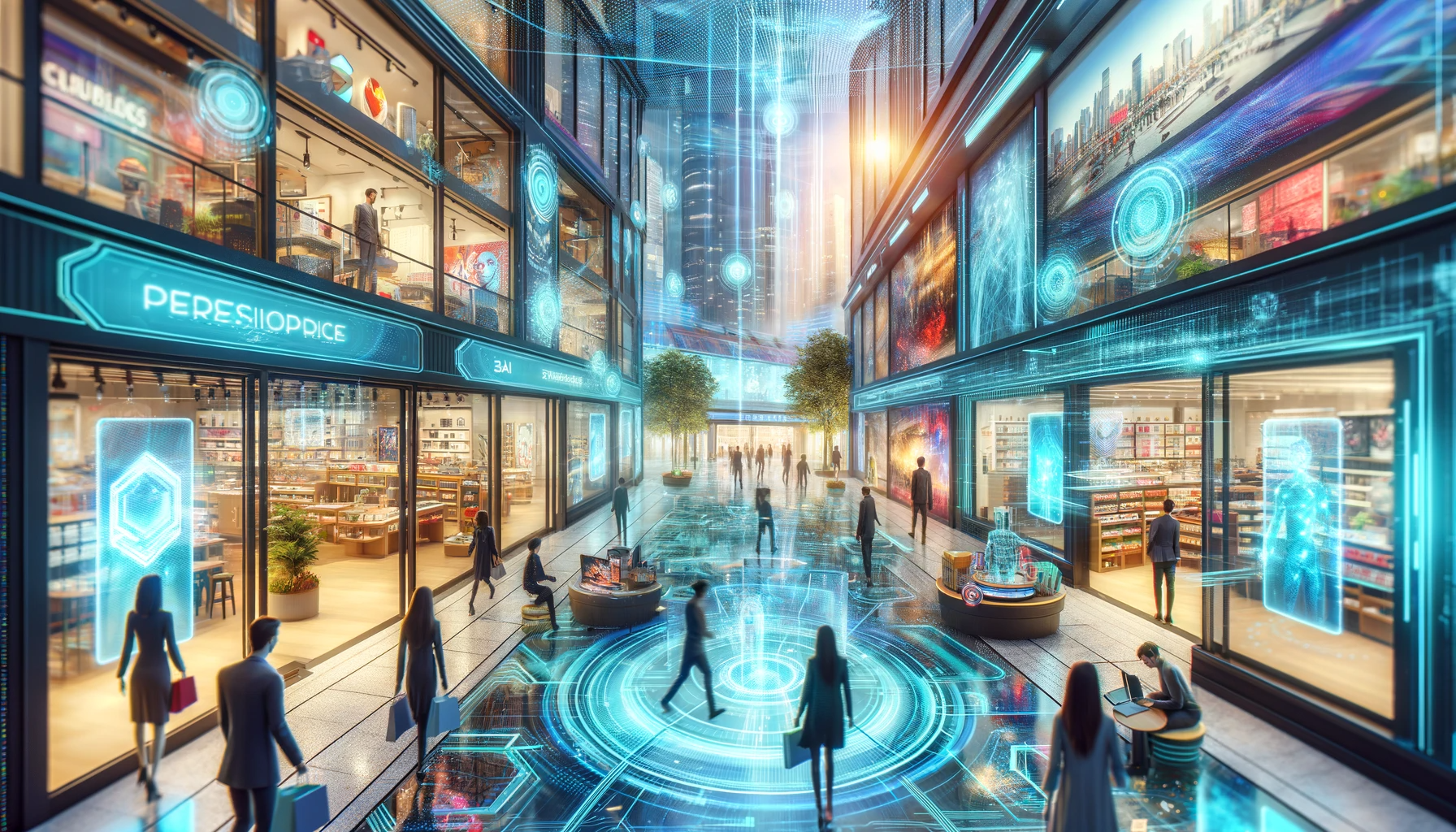The Dawn of a New Era: AI’s Pivotal Role in Retail
Imagine a time when retail was purely bricks and mortar, where customer interactions were solely face-to-face, and data analysis meant sifting through paper receipts. That was the world I navigated as I managed a chain of optometrists, and later, as I spearheaded the UK’s biggest e-commerce site for designer sunglasses. Those days now seem like a different lifetime, especially as we step into the era where Artificial Intelligence (AI) is revolutionising retail in ways we only dreamed of.
Back in 2012, I dipped my toes into the future with a blog post about augmented reality glasses, speculating on their potential impact. Little did I know, this was just the tip of the iceberg. Today, AI in retail has moved from speculation to reality, fundamentally transforming how we understand customer journeys and reshape sales metrics.
After reflecting on my journey and the significant shifts in the retail landscape, my recent podcast conversation with Lewis Rothkopf, Chief Revenue Officer of Pairzon, further ignited my passion for this subject. Lewis’s insights into AI’s role in bridging online and offline sales gaps were enlightening and underscored the immense potential AI holds for the retail industry. This discussion was a pivotal moment, inspiring me to delve deeper into how AI is transforming retail, leading to the creation of this blog. For a more in-depth exploration of these ideas, I invite you to listen to the podcast, which I’ve embedded below.
In this post, I’ll walk you through how AI is not just an add-on but a necessity in modern retail, drawing from my own journey of transition from traditional retail to embracing the digital age. Let’s explore how AI is not only changing the game but also setting new rules for customer engagement and sales success in retail.
What is AI in Retail and How is it Changing the Game?
What Role Does AI Play in Modern Retail?
In the retail landscape, AI is akin to a master chess player, strategically enhancing every aspect of the business, from supply chain logistics to personalised customer experiences. Reflecting on my early days in retail, where intuition and manual processes were key, the contrast with today’s AI-driven methods is stark.
In those days, understanding customer needs was more of an art than a science. We relied heavily on face-to-face interactions and gut feelings to gauge customer preferences. Fast forward to now, AI in retail has ushered in an era where data-driven insights govern strategies. AI algorithms now predict shopping trends, manage inventory with precision, and create personalised shopping experiences that were once the realm of science fiction.
My journey from managing retail stores to navigating the complex world of e-commerce highlighted a pivotal shift. The transition from traditional to digital was not just about moving sales online but embracing technologies like AI to understand and serve customers better. AI in retail is not just about automation; it’s about creating a more intuitive, responsive, and engaging shopping experience that aligns with modern consumer expectations. As we delve deeper into the AI revolution, the possibilities for transforming retail seem boundless.
The Impact of AI on Customer Journeys
How Does AI Enhance the Retail Customer Experience?
AI is revolutionising the retail sector by tailoring customer journeys to an unprecedented degree. Here’s how:
- Personalised Recommendations: AI analyses browsing habits, purchase history, and customer preferences to suggest products that are more likely to appeal to each individual shopper. In my work with large retailers, we’ve seen how this personalisation can lead to increased customer satisfaction and loyalty.
- Seamless Omnichannel Experiences: AI helps retailers offer a cohesive experience across online and offline channels. For example, a customer might receive a personalised email based on their in-store purchases. This integration creates a sense of continuity that resonates well with modern shoppers.
- Predictive Analytics: AI’s predictive capabilities allow retailers to forecast trends and customer needs. This foresight enables businesses to stock items that are likely to be in demand, ensuring they meet customer expectations proactively.
- Enhanced Customer Service: AI-powered chatbots and virtual assistants provide instant, 24/7 customer service, answering queries and offering help. This immediacy and convenience significantly enhance the customer experience.
- Real-Time Inventory Management: AI helps in maintaining optimum stock levels, reducing the chances of out-of-stock situations or overstocking, which can impact customer satisfaction and business profitability.
- Customer Feedback Analysis: AI algorithms can sift through customer reviews and feedback, providing actionable insights to improve products and services.
During my tenure at the helm of the UK’s biggest e-commerce site for designer sunglasses, integrating AI into our digital strategy would have been a game-changer. It would have enabled us to understand our customers better, anticipate their needs, and offer a shopping experience that was not just transactional, but personal and engaging. As we continue to explore AI’s potential, it’s exciting to consider how it will further refine and redefine the retail customer journey.
Transforming Sales Metrics with AI
How Can Retailers Leverage AI to Boost Sales?
AI isn’t just a buzzword in retail; it’s a potent tool for reshaping how sales metrics are understood and optimised. Here’s a closer look at its impact:
- Predictive Sales Trends: AI algorithms can analyse vast amounts of data to predict future sales trends. This predictive power enables retailers to prepare for demand spikes, manage inventory more effectively, and tailor marketing campaigns to anticipated customer interests.
- Targeted Marketing Campaigns: By understanding customer preferences and behaviors, AI allows for highly targeted and personalised marketing. Campaigns based on AI insights tend to have higher conversion rates, as they resonate more with individual customers.
- Dynamic Pricing Strategies: AI can dynamically adjust prices based on various factors, such as demand, competitor pricing, and customer willingness to pay. This flexibility ensures competitive pricing while maximising profit margins.
- Customer Lifetime Value Analysis: AI models can calculate the lifetime value of customers, helping retailers focus on retaining high-value customers and increasing their spending over time.
- Enhanced Online User Experience: Through AI, e-commerce platforms can provide personalised user experiences. During my journey in e-commerce, especially post the Google penalty in 2004, embracing digital strategies was crucial for digital resurrection. We used digital transformation to tailor product displays, search results, and recommendations, leading to a significant uplift in engagement and conversions.
- Efficient Stock Management: AI can predict which products will be popular and when, helping retailers manage their stock more efficiently. Overstocking or stockouts can be costly issues that AI helps to mitigate.
In my early days in retail, managing a chain of optometrists, I quickly learned the importance of understanding customer needs and preferences. As I ventured into the e-commerce world, AI would have been an invaluable ally, transforming how we approached sales, customer engagement, and inventory management.
Leveraging AI is not just about embracing technology; it’s about adapting to a changing retail landscape where customer-centricity and data-driven decisions are key to success.
AI in Action: Case Studies and Real-World Examples
Real-World Applications of AI in Retail
AI’s influence in retail is vast and varied. Here are some tangible examples where AI has made a significant impact:
- Personalised Shopping Experiences: One prominent fashion retailer implemented an AI system that analysed past purchase data and browsing behavior. The result was a highly personalised shopping experience for each customer, with tailored recommendations that led to a 31% increase in sales.
- Inventory Optimisation: A large grocery chain used AI to predict product demand at different times, leading to more efficient stock management. This approach reduced wastage by 23% and improved customer satisfaction due to better product availability.
- Customer Service Chatbots: An electronics retailer introduced AI-powered chatbots that provided instant customer support. These chatbots handled common queries, freeing up staff for more complex issues. The result was a 40% reduction in customer service wait times and a significant boost in customer satisfaction scores.
Reflecting on My Journey:
- Adapting to AI in E-commerce: Post the Google penalty in 2004, we could have used AI to rebuild our online sunglasses store. AI would have helped us in personalised marketing, resulting in a remarkable recovery and growth in sales.
- Insights from Retail Management: During my time managing optometrist stores, I learned the importance of understanding customer needs. AI now provides these insights on a much larger scale, allowing for more effective stock management and personalised customer interactions.
These case studies are just a snapshot of AI’s transformative potential in retail. My journey from managing optometrist stores to leading a successful e-commerce platform has shown me that embracing AI is crucial for staying ahead in the dynamic world of retail. AI not only solves complex problems but also opens new avenues for growth and customer connection.
The Challenges and Opportunities of AI in Retail
Navigating the AI Terrain in Retail
Adopting AI in retail comes with its unique set of challenges. Let’s explore these and how they can be addressed:
- Data Privacy Concerns: With AI relying heavily on customer data, privacy becomes a paramount issue. Retailers must ensure compliance with data protection regulations like GDPR. Solution: Invest in secure, transparent data handling practices and educate customers about their data usage.
- Integration with Existing Systems: Many retailers struggle to integrate AI with their current technological infrastructure. Solution: Opt for scalable AI solutions that can be integrated incrementally. During my sunglasses e-commerce venture, gradual integration of AI for marketing and inventory management proved effective.
- Skill Gap and Training: The lack of AI expertise in traditional retail settings is a significant barrier. Solution: Invest in training programs and consider hiring or partnering with AI specialists. Reflecting on my own journey, continuously learning and adapting to new technologies was key to overcoming digital challenges.
- Cost Concerns: Smaller retailers often view AI as a costly investment. Solution: Start small with cost-effective AI tools and scale as you see ROI. This approach mirrors my early steps in retail, where cautious yet strategic investments in technology paved the way for growth.
- Understanding Customer Behaviour: AI can provide insights, but interpreting this data to truly understand customer needs is challenging. Solution: Combine AI data with human intuition and customer feedback, just as I balanced data-driven strategies with customer interactions in optometry management.
- Unrealistic Expectations: Retailers sometimes expect immediate and dramatic results from AI. Solution: Set realistic goals and understand that AI is a tool for gradual improvement, not an instant solution.
My career in retail, from managing physical stores to running a leading e-commerce platform, has taught me that while challenges are inevitable when adopting new technologies like AI, they also present opportunities for innovation and growth. The key is to approach these challenges with a balanced perspective, leveraging both technological solutions and human insights.
The Future of AI in Retail: Predictions and Trends
Where is AI in Retail Headed?
As we look towards the future, AI in retail is poised to create even more transformative changes. Drawing from my foresight about augmented reality in 2012, here are my predictions for AI in the retail landscape:
- Seamless Omnichannel Experiences: AI will bridge the gap between online and offline retail even further. We’ll see AI facilitating a seamless transition from digital browsing to in-store purchasing, much like the augmented reality potentials I envisioned a decade ago.
- Hyper-Personalised Shopping: AI will move beyond just recommending products based on browsing history. It will understand individual customer preferences deeply, possibly even predicting needs before the customer realises them, akin to how augmented reality promised a more personalised world.
- Smart Inventory Management: Leveraging AI for inventory will become more sophisticated. We’ll see AI predicting stock levels with greater accuracy, minimising waste and maximising sales opportunities.
- AI-Powered Virtual Assistants: The evolution of AI will lead to more advanced virtual shopping assistants, capable of providing personalised advice and support, reminiscent of the early concepts of interactive augmented reality.
- Sustainability through AI: Retailers will increasingly use AI to make sustainable choices in their supply chain and product offerings, reflecting the growing consumer demand for environmentally conscious shopping.
- Innovative Payment Solutions: AI will revolutionise payment methods, offering more secure and efficient transaction processes, possibly integrating biometrics for enhanced security.
Reflecting back on my early days in retail management and the evolution of my e-commerce venture, it’s clear that AI is not just a trend but a fundamental shift in how retail operates. Just as augmented reality glasses once seemed like a glimpse into a distant future, today’s AI innovations in retail are rapidly becoming the new standard, shaping a more efficient, personalised, and insightful retail experience.
Final Thoughts
As we’ve explored throughout this discussion, AI’s transformative power in retail is not just a fleeting trend; it’s a fundamental shift in how the industry operates. From enhancing customer journeys to revolutionising sales metrics, AI is reshaping the retail landscape, offering opportunities for unprecedented growth and efficiency.
Reflecting on my journey, from managing a chain of optometrists to spearheading the UK’s largest e-commerce site for designer sunglasses, I’ve witnessed firsthand the evolution of retail. My early fascination with augmented reality and digital innovation has evolved into a deep passion for the limitless possibilities AI brings to retail.
In closing, my commitment remains steadfast: to help businesses navigate and adapt to this ever-changing landscape. The future of retail is bright, and it’s being written by the innovative use of AI. As someone who has been at the crossroads of retail transformation, I’m excited to be part of this journey and to continue contributing to an industry that never ceases to inspire and innovate.
What do you think?
I’m eager to hear your perspectives and experiences regarding AI in retail. Have you witnessed its impact firsthand? Are there particular challenges or successes you’ve encountered? Your insights enrich our collective understanding and drive the conversation forward.
I also encourage you to dive deeper into the subject through my podcasts and other resources. Each story and discussion adds a layer to our comprehension of AI’s role in transforming retail.
For a glimpse into the early days of digital innovation in retail, check out my 2012 blog post on augmented reality. It’s fascinating to see how some of those predictions have materialised today.
Talk to me to discover more about my transition from leading the UK’s biggest e-commerce site for designer sunglasses to becoming an SEO expert in this snapshot of my journey. It’s a story of embracing change, overcoming digital challenges, and continuously learning – a path I believe many in retail can relate to.







